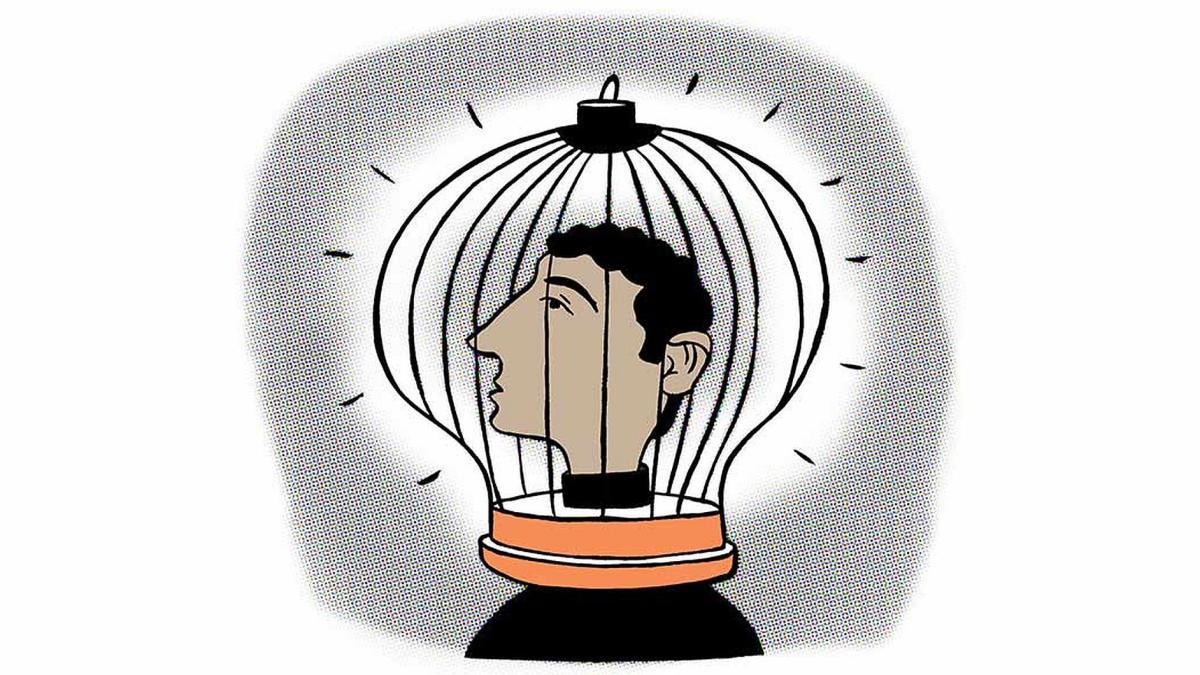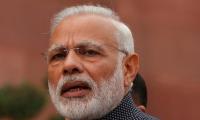Matrimony.com, Sharechat Oppose IAMAI's Digital Competition Bill Stance
Matrimony.com, Sharechat, and two other companies disagree with IAMAI's submission on the draft digital competition bill, arguing it doesn't represent the entire startup ecosystem.

Illustration: Dominic Xavier/Rediff.com
New Delhi, Jun 1 (PTI) Matrimony.com and Sharechat are among four companies that have written to the Ministry of Corporate Affairs, saying they do not agree with the submissions on draft digital competition bill made by industry association IAMAI, of which they are members.
IAMAI's submission, they claim, is not reflective of the entire digital startup ecosystem or its diverse membership of over 540 companies.
According to them, while only a small fraction of members have opposed the 'ex-ante' provisions introduced by the Draft Digital Competition Bill (DCB), yet the submission made by the association "predominantly echoes this minority perspective".
Any opposition to 'ex ante' regulations and continuation of the 'ex post regime' will allow entrenched players to "continue exploiting regulatory gaps to stifle competition and innovation", they argued.
The letter sent to Corporate Affairs Secretary Manoj Govil earlier this week was signed by Murugavel Janakiraman, Founder and MD of Matrimony.com; Vishnu Moha, Co-founder of Hoichoi; Morgan Cauvin, Head, Government Relations, India and Europe, Middle East, Africa, Match Group; and Manohar Singh Charan, Chief Financial Officer, Sharechat.
"...signatories, all members of the Internet and Mobile Association of India (IAMAI), write to express our diverging views to IAMAI's recent submission on the Draft Digital Competition Bill (DCB) and the Report of the Committee on Digital Competition Law. We state that IAMAI's submission is not reflective of the entire digital startup ecosystem or IAMAI's diverse membership of over 540 companies as only a miniscule percentage of these members have opposed the ex-ante provisions introduced by the DCB, yet the submission predominantly echoes this minority perspective," the letter said.
Put simply, the 'ex-ante' provision aims to ensure that the behaviours of large digital enterprises are proactively monitored and that the CCI intervenes before instances of anti-competitive conduct transpire.
Currently, the Competition Act primarily envisages an 'ex-post' framework of intervention, wherein the CCI intervenes after the occurrence of an anti-competitive conduct.
The dissenting companies, in their letter, said they believe that opposition of 'ex ante' regulations and continuation of the 'ex post regime', will lead to status quo being maintained and allow entrenched players to continue exploiting regulatory gaps to stifle competition and innovation.
The invocation of 'Minimum Government, Maximum Governance' conveniently ignores the reality of market distortions and abuses that necessitate targeted regulatory interventions, they said.
"While we share similar concerns over the thresholds for designation of Systemically Significant Digital Enterprise (SSDEs), IAMAI's submission on the rest of the draft DCB seems to present obtuse concerns which go against the broader imperative of fostering fair competition across all core digital services in India, supporting the growth of startups and protecting consumer welfare in India's digital economy," the letter said.
The thresholds for designation of an SSDE may require revision to ensure that only those entities which are sufficiently large and having substantial presence in digital markets in India are subject to the ex-ante regulations proposed in the DCB.
"This ensures that financial strength and user spread thresholds outlined in the DCB do not inadvertently encompass startups and other digital enterprises which are not true digital gatekeepers. This issue can also be effectively addressed by advocating for higher thresholds, so nascent digital services /products remain protected...By revisiting thresholds, it can be ensured that only the largest digital gatekeepers (or 'Big Tech' companies), which have benefitted from network effects, fall within the DCB's scope," it said.
The letter exhorted the Ministry of Corporate Affairs to move forward with the draft DCB at the earliest.
"We believe that any lingering apprehensions can be effectively addressed during the drafting of the regulations under the draft DCB, ensuring that the Indian digital ecosystem benefits from a clear regulatory framework that fosters fair competition and incentivises innovation among startups and smaller businesses without fear of suppression by larger dominant gatekeepers," it said.
IAMAI's submission, they claim, is not reflective of the entire digital startup ecosystem or its diverse membership of over 540 companies.
According to them, while only a small fraction of members have opposed the 'ex-ante' provisions introduced by the Draft Digital Competition Bill (DCB), yet the submission made by the association "predominantly echoes this minority perspective".
Any opposition to 'ex ante' regulations and continuation of the 'ex post regime' will allow entrenched players to "continue exploiting regulatory gaps to stifle competition and innovation", they argued.
The letter sent to Corporate Affairs Secretary Manoj Govil earlier this week was signed by Murugavel Janakiraman, Founder and MD of Matrimony.com; Vishnu Moha, Co-founder of Hoichoi; Morgan Cauvin, Head, Government Relations, India and Europe, Middle East, Africa, Match Group; and Manohar Singh Charan, Chief Financial Officer, Sharechat.
"...signatories, all members of the Internet and Mobile Association of India (IAMAI), write to express our diverging views to IAMAI's recent submission on the Draft Digital Competition Bill (DCB) and the Report of the Committee on Digital Competition Law. We state that IAMAI's submission is not reflective of the entire digital startup ecosystem or IAMAI's diverse membership of over 540 companies as only a miniscule percentage of these members have opposed the ex-ante provisions introduced by the DCB, yet the submission predominantly echoes this minority perspective," the letter said.
Put simply, the 'ex-ante' provision aims to ensure that the behaviours of large digital enterprises are proactively monitored and that the CCI intervenes before instances of anti-competitive conduct transpire.
Currently, the Competition Act primarily envisages an 'ex-post' framework of intervention, wherein the CCI intervenes after the occurrence of an anti-competitive conduct.
The dissenting companies, in their letter, said they believe that opposition of 'ex ante' regulations and continuation of the 'ex post regime', will lead to status quo being maintained and allow entrenched players to continue exploiting regulatory gaps to stifle competition and innovation.
The invocation of 'Minimum Government, Maximum Governance' conveniently ignores the reality of market distortions and abuses that necessitate targeted regulatory interventions, they said.
"While we share similar concerns over the thresholds for designation of Systemically Significant Digital Enterprise (SSDEs), IAMAI's submission on the rest of the draft DCB seems to present obtuse concerns which go against the broader imperative of fostering fair competition across all core digital services in India, supporting the growth of startups and protecting consumer welfare in India's digital economy," the letter said.
The thresholds for designation of an SSDE may require revision to ensure that only those entities which are sufficiently large and having substantial presence in digital markets in India are subject to the ex-ante regulations proposed in the DCB.
"This ensures that financial strength and user spread thresholds outlined in the DCB do not inadvertently encompass startups and other digital enterprises which are not true digital gatekeepers. This issue can also be effectively addressed by advocating for higher thresholds, so nascent digital services /products remain protected...By revisiting thresholds, it can be ensured that only the largest digital gatekeepers (or 'Big Tech' companies), which have benefitted from network effects, fall within the DCB's scope," it said.
The letter exhorted the Ministry of Corporate Affairs to move forward with the draft DCB at the earliest.
"We believe that any lingering apprehensions can be effectively addressed during the drafting of the regulations under the draft DCB, ensuring that the Indian digital ecosystem benefits from a clear regulatory framework that fosters fair competition and incentivises innovation among startups and smaller businesses without fear of suppression by larger dominant gatekeepers," it said.
You May Like To Read
TODAY'S MOST TRADED COMPANIES
- Company Name
- Price
- Volume
- Vodafone-Idea-L
- 11.65 (+ 3.56)
- 106772451
- Alstone-Textiles
- 0.28 ( -3.45)
- 44187760
- Mangalam-Industrial
- 0.88 ( -2.22)
- 39177573
- Sunshine-Capital
- 0.27 (+ 3.85)
- 35956340
- GMR-Airports
- 104.40 (+ 6.37)
- 30453005





